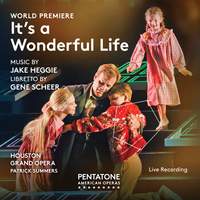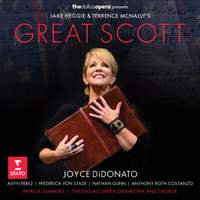Interview,
Jake Heggie on It's A Wonderful Life
 Always one to cling onto the last vestiges of Christmas cheer well past Twelfth Night, I recently found myself whiling away a long January evening by re-watching Frank Capra’s seasonal classic It’s A Wonderful Life whilst polishing off the remaining Presto stash of Quality Street - which led me in turn to start exploring Jake Heggie’s recent opera inspired by the film, premiered in December 2016 by Houston Grand Opera and released on Pentatone towards the end of last year. It’s an immediately appealing, open-hearted delight of a score which captures much of the magic (and indeed the underlying darkness) of the movie whilst radiating a charm that’s all its own; I caught up with the composer (whose latest opera, Great Scott, has also just been released on Warner Classics, with Joyce DiDonato in the title-role) to find out more about the challenges of bringing such a well-known and well-loved film to the operatic stage…
Always one to cling onto the last vestiges of Christmas cheer well past Twelfth Night, I recently found myself whiling away a long January evening by re-watching Frank Capra’s seasonal classic It’s A Wonderful Life whilst polishing off the remaining Presto stash of Quality Street - which led me in turn to start exploring Jake Heggie’s recent opera inspired by the film, premiered in December 2016 by Houston Grand Opera and released on Pentatone towards the end of last year. It’s an immediately appealing, open-hearted delight of a score which captures much of the magic (and indeed the underlying darkness) of the movie whilst radiating a charm that’s all its own; I caught up with the composer (whose latest opera, Great Scott, has also just been released on Warner Classics, with Joyce DiDonato in the title-role) to find out more about the challenges of bringing such a well-known and well-loved film to the operatic stage…
When did you first see Frank Capra’s film, and what attracted you to it an operatic subject?
I honestly don’t remember when the first time was. But beginning with my far-off youth, it has always been part of my Christmas experience – as have been Charlie Brown Christmas, The Grinch Who Stole Christmas, etc. In 2011, my friend Patrick Summers (the great conductor and music director of the Houston Grand Opera) asked if I would consider composing a Christmas opera for the company. Something that could be done in an alternative space while the ballet was reigning with The Nutcracker. I thought about stories we return to again and again at Christmas and suddenly It’s A Wonderful Life came to mind. It seems innately operatic because the emotional journey and transformation is so immense – I mean, at the center of it is a man thinking of taking his life. It had been treated as a musical, but never as an opera and it felt right to me. It has the added benefit of being a title in the popular consciousness. But first and foremost, it struck me as innately operatic.
It’s obviously a subject with huge musical potential – but did you see (and avoid!) any potential pitfalls in adapting such a well-known and well-loved movie for the operatic stage?
It was one of the most challenging projects Gene Scheer and I had ever jumped into. We were to take this iconic, masterful film that exists ONLY as a film, and find a way to make it work on the opera stage. That meant cutting ruthlessly and inventing new things, especially a way to tell the story actively rather than just with a narrator. The movie has more than 30 named characters. We couldn’t do that – so we would have to simplify and find a strong way to tell the story that would be convincing.
We learned a lot from the first production and made big changes after the premiere (and this recording)! We cut about 10% of the opening material, cut the character of Mr Gower completely, expanded arias for George and Mary, and added two new duets in Act Two. Act One is now 55 minutes (instead of 65).
Were you at all influenced by Dmitri Tiomkin’s score for the film, or did you avoid any overt echoes of the movie soundtrack?
No, I didn’t consider his score at all when writing. I looked for music that would reflect the world of the heavens as well as the earthly world of Bedford Falls. The characters emerged pretty quickly and clearly in my musical imagination. I think you can hear the influence of the 20s, 30s & 40s in the score – but I let it be an influence rather than quoting any existing music.
The coloratura writing for George’s guardian angel is spectacular! What was behind the decision to reimagine ‘Clarence’ as ‘Clara’?
Thank you. It’s opera, and vocal casting is everything. I’d much rather hear a tenor & soprano together through the evening than a tenor and baritone, plus we were looking for ways to really make the story our own – different from the movie and specifically for the opera stage.
On a similar note, I found that when I mentioned this adaptation to fans of the film many of them assumed that George would be a baritone role – was this something you considered at any stage, and how closely did how collaborate with William Burden during the writing process?
Oh yes! We definitely thought about George being a baritone. Then we started thinking about vocal casting again: how George is an optimistic dreamer whose vision of his life must soar. He has to go from quite young (age 22) to his early 40s. I don’t remember who suggested Bill Burden, but that’s when it all clicked and made total sense. There’s something innately optimistic, clear and youthful about Bill’s singing and presence on stage. So a tenor who sings that rep (like Tom Rakewell in The Rake’s Progress) could sing George. Then it made sense for his brother Harry to be a baritone, Uncle Billy more of a character tenor, Mr Potter a baritone, Mary a soprano (of course), etc.
I thought I heard echoes of Peter Grimes in the scene which depicts George’s breakdown – was that a conscious decision?
You’re the first to mention it – and I wasn’t thinking about Peter Grimes, but I see your point. I remember when writing it thinking we need to know what’s going on in George’s head: what pushes him to the brink and takes him to the bridge. That cacophony of voices was the solution.
George’s children have pivotal but non-singing roles – was that due to the difficulty of casting very young singers, or was it a purely aesthetic decision?
Yes, it was a practical choice. To have that many children onstage with very little rehearsal-time and hope they could sing and be heard would have been next to impossible. Children also get sick and lose their voices, or their voices change. It’s one thing to have a children’s choir – quite another to cast all those parts as singing roles.
Relatedly, George’s nightmarish vision of how events would have played out had he not been born is entirely spoken: did you ever contemplate setting this passage, or did you feel from the outset that it would be more powerful without music?
We decided that the world without George Bailey is a world without music. It needed to be VERY different from what we’ve heard before, and the chance for a different reality to emerge through an electronic soundscape. Practically speaking, as well, setting that scene to music would have added another 10 minutes to the opera: we didn’t need that. We’d also had wall-to-wall music already, so the absence of it felt like a bold statement.
Finally, that final chorus of Auld Lang Syne (which famously closes the film) happens after the audience applause on the recording – is that part of the score proper, or was it inserted as an encore?
It is in the score and intended to be a Finale and Sing-along with the audience.
'Scheer is such an accomplished librettist in his understanding of how words and music collide in the theatre…[Heggie] is a born melodist, purveyor of the most grateful, ‘singable’ vocal lines and a word-setter of real eloquence…Not a dry eye in the house.' (BBC Music Magazine).
Available Formats: 2 SACDs, MP3, FLAC, Hi-Res FLAC
Heggie: Great Scott
Joyce DiDonato (Arden Scott), Ailyn Pérez (Tatyana Bakst), Frederica von Stade (Winnie Flato), Nathan Gunn (Sid Taylor), Anthony Roth Costanzo (Roane Heckle) Orchestra and Chorus of The Dallas Opera, Patrick Summers
'[Heggie's] gift for creative partnerships is supreme...The conceit gets DiDonato singing pastiche Bellini, scaling coloratura flights, surviving a mad scene and crooning in velvet; all pleasing to hear' (The Times)
Available Formats: 2 CDs, MP3, FLAC, Hi-Res FLAC, Hi-Res+ FLAC




